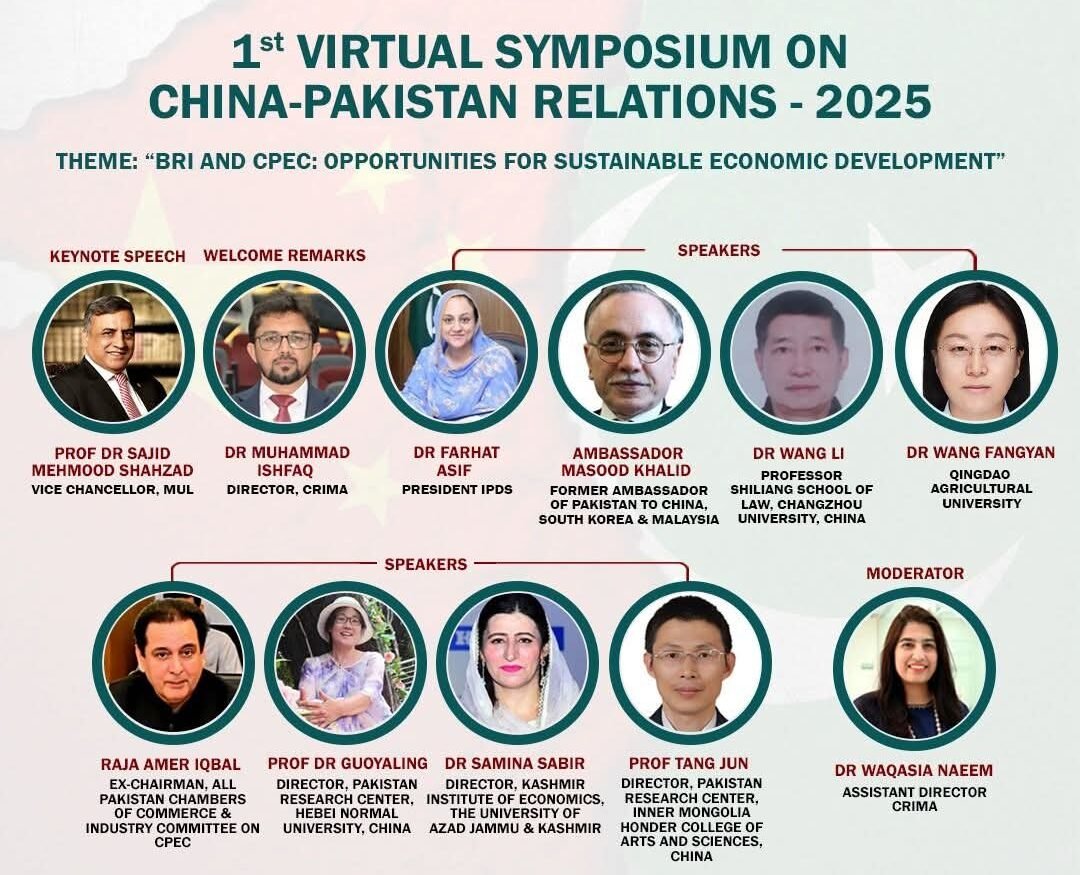On September 18, 2025, the Centre for Research in Maritime Affairs (CRIMA) and Institute of Peace and Diplomatic Studies (IPDS) organized the 1st Virtual Symposium on China–Pakistan Relations – 2025 under the theme “BRI and CPEC: Opportunities for Sustainable Economic Development.”
The symposium was attended by record breaking 850 students, teachers and researchers; gathered both virtually and in-person at Minhaj University, Lahore which houses CRIMA.
The event brought together seven distinguished speakers from Pakistan and China to discuss the role of the Belt and Road Initiative (BRI) and the China–Pakistan Economic Corridor (CPEC) in fostering sustainable growth.

The symposium opened with welcoming remarks from Dr. Muhammad Ishfaq, Director of CRIMA, who introduced the vision and activities of the Centre.
He was followed by Dr. Farhat Asif, President of the IPDS, who elaborated on the mission and initiatives of IPDS.
Read More: IPDS, MU Jointly Organize First Virtual Symposium on China-Pakistan Relations
Professor Dr. Sajid Mehmood Shahzad, Vice Chancellor of Minhaj University Lahore, extended a warm welcome to the guest speakers and participants, setting the stage for the day’s discussions.
The webinar featured thought-provoking contributions from experts on both sides.
From the Chinese perspective, Prof. Dr. Guoyaling, Director at Hebei Normal University, underscored China’s continued efforts in addressing trade imbalances, promoting educational cooperation, and strengthening bilateral ties.
In her presentation, she discussed the establishment of five thematic corridors which included livelihood, growth, green, innovation, and strategic corridors to broaden the scope of CPEC and make it more sustainable.

Dr. Samina Sabir, Director at the University of Azad Jammu and Kashmir, reflected on the evolution of CPEC, describing its dual phases. She explained that while the first phase prioritized infrastructure, CPEC 2.0 will emphasize inclusivity, people-centered development, and integration of social sectors.
Additional insights came from Prof. Tang Jun, Director at Inner Mongolia Honder College of Arts and Sciences Raja Amer Iqbal, former Chairman of the All Pakistan Chambers of Commerce & Industry Committee on CPEC, reinforced these views, calling for stronger government efficiency and practical translation of strategies into action.
Read More: President IPDS and Chairperson of Diplomatic Insight Group Participates in IVLP
He emphasized the critical reforms required within Pakistan for successful CPEC implementation.
He highlighted the need for efficient governance interventions, resolution of connectivity and distance-related challenges, and a consensus-driven approach between Pakistan’s parliament and stakeholders, along with China, to transform plans into tangible development outcomes.
Dr. Wang Fangyan, Professor at Qingdao Agricultural University, showcased the achievements of QAU through a presentation, particularly highlighting the innovative technologies developed after extensive research.

His contribution demonstrated the role of agricultural science and technology in enhancing economic resilience and in opening new avenues of collaboration between China and Pakistan.
The symposium concluded with closing remarks from Dr. Waqasia who thanked the speakers and participants for their valuable contributions. She emphasized the importance of sustained dialogue, mutual learning, and collaborative initiatives to ensure that BRI and CPEC serve as platforms for inclusive and sustainable economic development.
Established in December 2008, The Diplomatic Insight is Pakistan’s premier diplomacy and foreign affairs magazine, available in both digital and print formats.



